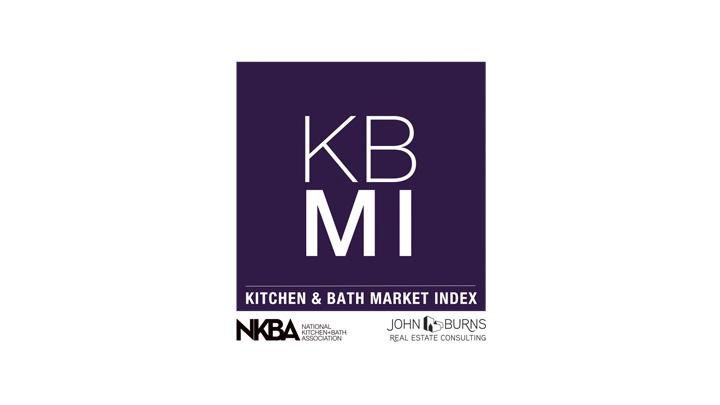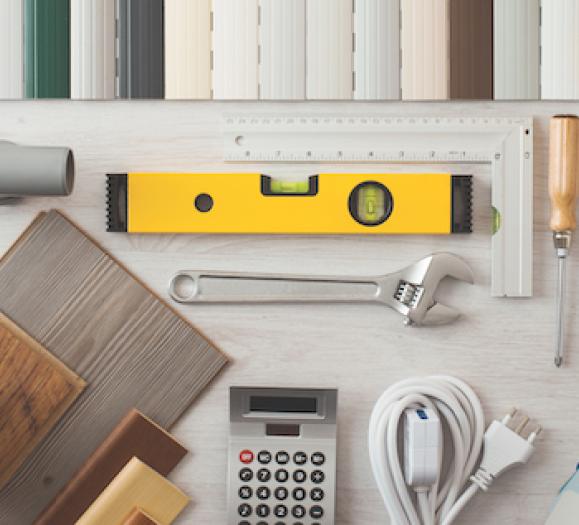The National Kitchen & Bath Association (NKBA) and John Burns Real Estate Consulting (JBREC) reported that their Q1 2021 Kitchen & Bath Market Index (KBMI) has soared to a rating 79.8, its highest score since the inception of the index.
KBMI measures the current strength of the industry, expectations and challenges facing four major sectors — design, manufacturing, retail and building — with scores above 50 indicating expansion and scores below 50, contraction. The current rating marks an increase of 14.8 points from last quarter alone and a 38.8 point improvement from this time last year.
Significantly, one in three designers noted that clients are now requesting higher-priced products and finishes. Retailers are experiencing that same customer shift. The trend is likely owing to quick-fix, pandemic-driven DIY projects running their course and being replaced by serious makeovers to accommodate new lifestyles.
“There is continued optimism in the industry with COVID-19 becoming less of an obstacle due to the rapid vaccine rollout,” said NKBA CEO Bill Darcy. “We are encouraged to see the index reach a historic high, and look forward to the continued industry growth as homeowners opt for larger, more upscale remodels.”
“As consumers experience more flexibility in their working arrangements, there’s an increased need for total reconfigurations for their spaces,” notes Todd Tomalak, Principal of JBREC. "And from an economic perspective, we've seen Americans utilizing their stimulus checks and savings from canceled vacations or other activations — which have been largely paused for the last year — for these home-improvement projects."
Overall, demand is at an all-time high as vaccination rates increase and for some, permanent and hybrid work-from-home lifestyles are encouraging consumers to reconfigure their home layouts. As the pandemic’s impact on the market starts to lessen and previously postponed projects resume, backlogs for projects are reaching upwards of three to six months. Continued supply chain disruptions from COVID-fueled demand and factory shutdowns at the onset of the pandemic are further affected by the Suez Canal incident and overall port congestion, but NKBA members remain confident in the industry outlook with expected sales to be markedly higher in Q2 2021.
As members see less of a negative impact from COVID-19 on their business, they reported a near-double-digit sales growth of 9.7% on average in Q1 2021, compared to the same period in 2020.
As for future sales and overall industry health, bullish demand and consumer confidence continue to fuel a positive outlook. Design companies have the lowest rating of the overall industry, at 76.1, while Building & Construction, Retail Sales and Manufacturing segments soar at 83.8, 82.2, and 86.7, respectively.
And overall, the industry increased full-year sales growth expectations to 13.4% in 2021, up from their rating of 10.7% in Q4 2020.
The following trends are expected to impact homeowners and the industry through 2021:
- Members are seeing larger project scopes as homeowners invest in whole-home reconfigurations and luxury finishes.
- Designers also cite permanent work-from-home lifestyles as a catalyst for the consumer shift to high-end, higher-priced materials and finishes with designer firms reporting a 61% increase in the average size of projects.
- The main obstacle for members is sourcing affordable materials as delays and price hikes make it difficult to maintain profit margins. More US-based sourcing could be likely as import delays and pricing become more severe and firms are sourcing outside their approved vendor list to accommodate.
- Appliances have been the most difficult products to source, with 51% of designers reporting difficulty sourcing refrigerators, ranges/stoves and dishwashers.
- The majority of firms are increasing labor rates to maintain current staffing levels and bolster recruitment efforts, but these increased costs aren’t expected to deter demand, as consumers are eager to remodel their primary bath and kitchen spaces.
Notable challenges and opportunities for the kitchen and bath market include:
- Over half of designers (55%) report no project cancellations or postponements in Q1, but 45% note material shortage and product pricing are starting to affect project timelines.
- As vaccination rates climb, consumers are more comfortable shopping in-person for items with over 50% of retailers reporting growth in foot traffic in Q1 2021 (compared to 35% in Q4 2020).
- 45% of retailers continue to report a shift in price-point with 70% shifting to higher prices, and despite price surges for some products, consumers are still opting to pay for high-end products and finishes. Refrigerators and ranges/stoves are seeing the highest price climb at 12% and 11%, respectively.
- 60% of manufacturing firms report average lead times of 6+ weeks in Q1 2021, a drastic increase from Q4 2020 (36% reporting 6+ week lead times). 78% of manufacturers report severe capacity constraints at this time, a rise from the prior quarter (23%) due to extended lead times on raw materials and significant freight delays.
- With the surge in remodeling demand, 67% of building and construction firms report a backlog of 3+ months and of that, 21% have a backlog extending through 2021.
- With the pandemic affecting many industry professionals, the already strained labor market continued to dwindle. In response, over 60% of companies report increasing labor rates to retain current staff and of the companies reporting labor rate increases, almost half report increasing labor rates 10-19%.







